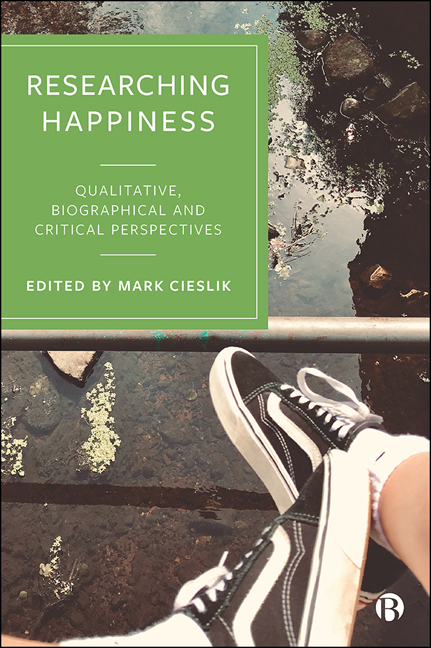Book contents
- Frontmatter
- Contents
- List of Figures and Tables
- Notes on Authors
- 1 Introduction: Developing Qualitative Research into Happiness and Wellbeing
- Part I Qualitative Research into Happiness/Wellbeing: Theories, Debates and Issues
- Part II Qualitative Research into Happiness/Wellbeing: Communities, Biographies and Identities
- Part III Qualitative Research into Happiness/Wellbeing: Methodological Innovations
- Index
6 - Considering the Body in Happiness Research
Published online by Cambridge University Press: 22 December 2021
- Frontmatter
- Contents
- List of Figures and Tables
- Notes on Authors
- 1 Introduction: Developing Qualitative Research into Happiness and Wellbeing
- Part I Qualitative Research into Happiness/Wellbeing: Theories, Debates and Issues
- Part II Qualitative Research into Happiness/Wellbeing: Communities, Biographies and Identities
- Part III Qualitative Research into Happiness/Wellbeing: Methodological Innovations
- Index
Summary
Introduction
The core aim of this chapter is to present an argument for a greater focus on the body in happiness research. I will explore what this might look like using my own work and insight from the last four years, which has mainly been focused on the significance of the body in people's lives across different age ranges, and how we see this translate into embodied practice. But why is it important to specifically consider the body in our research? How does the body and wellbeing actually relate? It is quite easy to think of bodies simply as functional, or indeed, to not think of bodies particularly much at all. The body does not naturally resonate with our lay understandings about happiness. We tend to acknowledge happiness more often as a cerebral concept, and think of ourselves as reasoned, feeling beings. However, I will go on to argue that we are also embodied beings too, and that this corporeal aspect of our presence in the world has ultimately been neglected in happiness research, but is an important and nuanced facet of our wellbeing. Researching wellbeing is already a complex endeavour and factoring the body into this can, of course, make those waters even murkier. This chapter, therefore, aims to demonstrate why it is still a worthwhile pursuit, and one that can lead us to a better understanding about the approaches that people adopt to live both fulfilling and meaningful lives.
The simplest argument I could present that endorses this claim is the overwhelming presence the body has in our everyday lives. A presence that, as researchers, we are often arguably guilty of overlooking, despite it actually being rather easy to see evidence of the body's significance all around us. We can gauge this visibility straight away in our own immediate reality; in our endeavours, actions, movements and experiences. Something as simple as the groan of a knee as we get up in the morning, or the warmth of a hug from a partner at the end of a difficult day can resonate with us in meaningful ways. Even when it is often quite difficult for us to articulate exactly why this is the case. We also see evidence of the body more generally in life and in the world around us, and we take stock of its value usually without much in the way of specific acknowledgement.
- Type
- Chapter
- Information
- Researching HappinessQualitative, Biographical and Critical Perspectives, pp. 113 - 132Publisher: Bristol University PressPrint publication year: 2021



